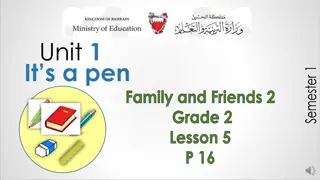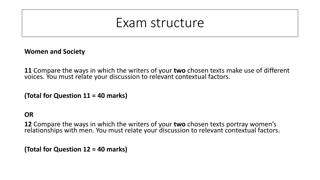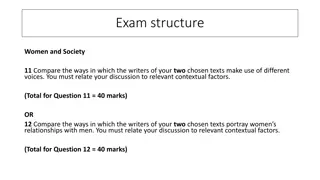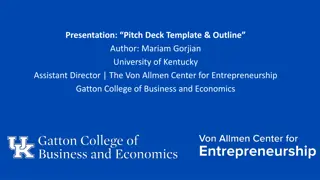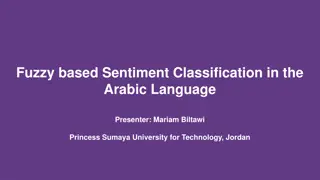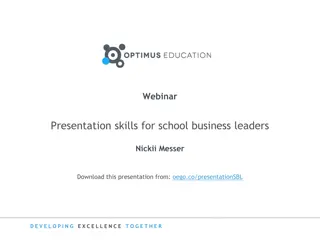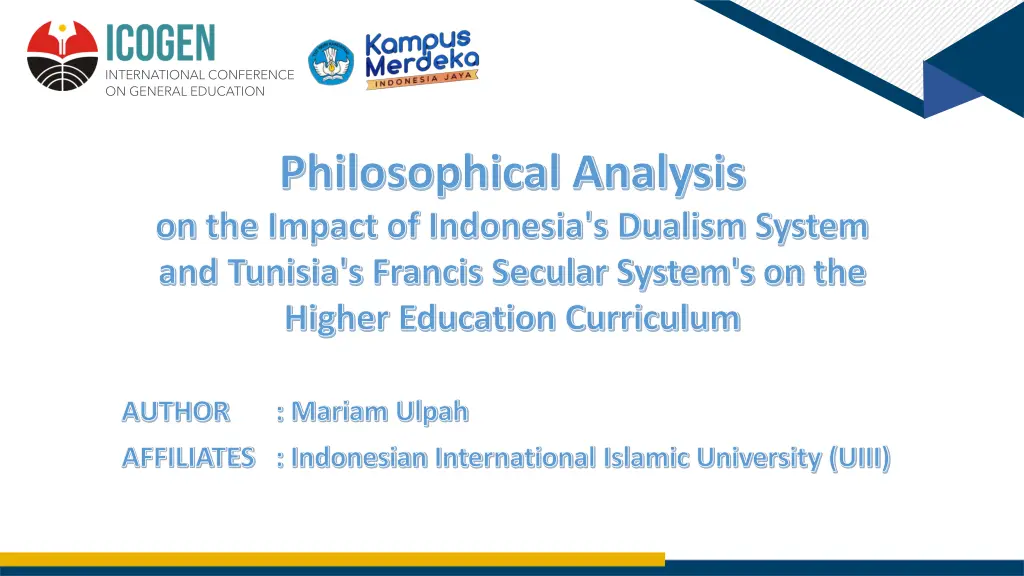
Impact of Indonesia's Dualism System on Higher Education Curriculum
Analyzing the impact of Indonesia's dualism system and Tunisia's secular system on higher education curriculum through philosophical analysis. The study compares the curriculum frameworks of both countries and explores how national ideologies influence educational quality.
Download Presentation

Please find below an Image/Link to download the presentation.
The content on the website is provided AS IS for your information and personal use only. It may not be sold, licensed, or shared on other websites without obtaining consent from the author. If you encounter any issues during the download, it is possible that the publisher has removed the file from their server.
You are allowed to download the files provided on this website for personal or commercial use, subject to the condition that they are used lawfully. All files are the property of their respective owners.
The content on the website is provided AS IS for your information and personal use only. It may not be sold, licensed, or shared on other websites without obtaining consent from the author.
E N D
Presentation Transcript
INTERNATIONAL CONFERENCE ON GENERAL EDUCATION Philosophical Analysis on the Impact of Indonesia's Dualism System and Tunisia's Francis Secular System's on the Higher Education Curriculum AUTHOR : Mariam Ulpah AFFILIATES : Indonesian International Islamic University (UIII)
FR FR INTERNATIONAL CONFERENCE ON GENERAL EDUCATION INTRODUCTION INTRODUCTION PROBLEM BACKGROUND
FR FR INTERNATIONAL CONFERENCE ON GENERAL EDUCATION INTRODUCTION INTRODUCTION Education has a critical role in developing a new generation of individuals. It all depends on the constitutional frameworks and norms around which educational institutions and educational praxis are founded, and education is one of the tools to maintain national identity. Therefore, there is a need to design a curriculum based on philosophy framework to increase the quality of education because it is not simply measured by the GDP spent on education. Even though Tunisia spends 26.63% of its budget on education, Indonesia spends only 20.50%. However, this does not guarantee that Tunisia is greater better than Indonesia. Due to the philosophically based disparities between the two countries, this study aims to compare the higher education curriculum in Tunisia, which was developed from the French secular or Laicite system, and Indonesia, which is designed with a dualism system by the lens of philosophical analysis. Meanwhile, this study aims to analyze how the Laicite and dualism systems impact the higher education curriculum design.
FR FR INTERNATIONAL CONFERENCE ON GENERAL EDUCATION METHOD METHOD This research is a concept paper with a systematic literature review method that focuses on the philosophical analysis in designing the curriculum in higher education institutions in Indonesia and Tunisia due to the impact of their national ideology. This paper primarily discussed the curriculum of public higher education in Indonesia and Tunisia based on philosophy framework. Data is gathered from the primary handbook of the curriculum in the ministry of education in Indonesia and the Ministry of Higher Education in Tunisia, including government documents, DIKTI curriculum books, and various additional sources those are relevant with the topic.
FR FR INTERNATIONAL CONFERENCE ON GENERAL EDUCATION RESULT RESULT OVERVIEW OF INDONESIA According to the Pancasila philosophy, which says "God Almighty," Indonesia does not distinguish between recognized religions Higher education is governed by Law No. 12 of 2012 on Higher Education and is also conducted in accordance with Pancasila, the Unitary State of Republic of Indonesia's Constitution of 1945, and Bhinneka Tunggal Ika (Unity in Diversity). The Pancasila-Based Curriculum entails the integration of Pancasila ideals into the educational system in terms of content, and teaching materials in order to achieve educational goals, particularly the development of love for the nation. According to Pancasila's ideas, Divine values, human values, unity values, populist values, and justice values are among the Pancasila values incorporated into the curriculum
FR FR INTERNATIONAL CONFERENCE ON GENERAL EDUCATION RESULT RESULT OVERVIEW OF TUNISIA History of Tunisia's Laicite System The Laicite system is the foundation of the modern secular French educational system. Tunisia became a French protectorate in 1881 and ended in 1956 Modern education was supposed to improve interactions between France and the native population by creating a knowledge of Arab Islamic culture and newly arrived European civilizations. A modern French education was also expected to develop a future Tunisian bureaucratic staff. The curriculum was approved by the French government, and all of the schools were staffed entirely by French teachers. The primary language of instruction was French
FR FR INTERNATIONAL CONFERENCE ON GENERAL EDUCATION RESULT RESULT OVERVIEW OF TUNISIA After Independence Tunisian constitution was adopted on June 1, 1959, and was updated on July 12, 1998. Tunisian law reflects a blend of major western and African legal concepts, traditions, and norms relating to how society can operate and be governed by the government. Tunisia's educational system is built on the "Napoleonic model," which was designed by the French colonizer during the protectorate, and education is free at all levels and mandatory for children aged 6 to 15 (primary and lower secondary education). Arabic and French are the languages of instruction
FR FR INTERNATIONAL CONFERENCE ON GENERAL EDUCATION DISCUSSION DISCUSSION Philosophy as A Basis for Curriculum Design in Indonesia There are Similarities between John Dewey's concepts and Ki Hajar Dewantara's, the 2013 curriculum is currently attempting to emphasize the student as a learner. Curriculum model is progressivism design, which is the curriculum emphasis to student interest and need, this model reflect to democracy, morality and social development. Ing ngarsa sung tuladha (in front of setting an example), Ing Madya mangun karsa (in the middle of building will), and Tutwuri handayani (in the back, giving encouragement and influence). Problem- Based Learning Collaborative Learning Discovery learning Small group discussion
FR FR INTERNATIONAL CONFERENCE ON GENERAL EDUCATION DISCUSSION DISCUSSION Philosophy as A Basis for Curriculum Design in Tunisia Tunisian university built on the Francis secular principle. Curriculum model is Existentialism design, which is focused on current social concerns. The teaching method in Tunisian universities is based on a crucial social system; the model aims to build critical consciousness in students to be aware of contemporary societal challenges. Problem- Based Learning social critical model-based Critical reasoning Self-autonomy
FR FR INTERNATIONAL CONFERENCE ON GENERAL EDUCATION DISCUSSION DISCUSSION Tunisia Curriculum Indonesia Curriculum Process Model of Curriculum Product Model of Curriculum The significant differences between the construction of the higher education curricula in Indonesia and Tunisia? "Classification Nationale des Qualifications" ("CNQ") system The Indonesian National Qualifications Framework (KKNI) Social Critical Models An experiential system The Inclusive Curriculum The exclusive curriculum
FR FR INTERNATIONAL CONFERENCE ON GENERAL EDUCATION DISCUSSION DISCUSSION Centralized Decentralized MANAGEMENT OF HIGHER EDUCATION IN INDONESIA The Laicite system and Pancasila ideology have an impact on the higher education curriculum design between Indonesia and Tunisia? MANAGEMENT OF HIGHER EDUCATION IN TUNISIA
FR FR INTERNATIONAL CONFERENCE ON GENERAL EDUCATION DISCUSSION DISCUSSION Development of Higher Education Curriculum in Indonesia University of Indonesia requires the Integrated Personality Development Course, or MPKT and Religious material, to be a compulsory university course delivered to students in the first semester in order to implement character education. The MPKT materials include the following: Humans, Morals, Pancasila Character, and Society; and Indonesia's Nation, Culture, and Environment, with the addition of Indonesian While, Tunisia has no compulsory religious on higher education. Every activity and learning approach taught through a learning system is SCL (Student- Centered Learning), which includes PBL (Problem-Based Learning) and CL (Collaborative Learning) Curriculum also include Independent Campus University of Indonesia emphasizes more on process-based learning curriculum design and prioritizes student Centre learning in experimental learning Pancasila ideology emphasizes character education in the development of a curriculum Compulsory internship courses in accordance with the curriculum-based competency based
FR FR INTERNATIONAL CONFERENCE ON GENERAL EDUCATION DISCUSSION DISCUSSION RELIGIOUS COMPONENT Between Curriculum in Department of Faculty of Culture at Indonesia University and the curriculum of the Faculty of Humanities and Social Sciences at Tunis University. Compulsory religious courses According to the Decree of the Director General of Higher Education No. 38/2002, the general objective of Islamic religious education in higher education is to provide a foundation for personality development for students to become intellectuals who believe and are devoted to God Almighty, have noble character, think philosophically, are rational and dynamic.
FR FR INTERNATIONAL CONFERENCE ON GENERAL EDUCATION DISCUSSION DISCUSSION Development of Higher Education Curriculum in Tuniaia Tunisia's tertiary education system follows the Bologna process norms. The LMD system. hence (Bachelor), Matere (Master), and Doctorate (Doctorat) degree The Product Model has been useful in producing and conveying transparent outcomes to the student population, as well as shifting the focus away from content lists. Traditional or discipline-based curricula and subject-centered designs were used in this model, which utilized a performance or systems perspective Tunisia uses the "employability throughout enterprise university" strategy in its higher education curriculum Tunis's Faculty of Humanities and Social Sciences, specifically the main campus courses, which include research methodology, French language, and 80 hours of internship in the first year, then a mandatory internship of 110 hours in the third year, and a compulsory Ethics and Responsibility course in the third year. Tunisia has a face-to-face lecture system in the form of packages, contrasting with Indonesia, which uses credits or a semester credit system The product model is still using the performance or systems approach, which is a traditional or discipline-based curriculum
FR FR INTERNATIONAL CONFERENCE ON GENERAL EDUCATION CONCLUSION CONCLUSION Indonesia's higher education curriculum currently employs an experience-based knowledge method at Indonesia University among many knowledge approaches. This assumption is supported by the curriculum handbook, which specifies that experiential learning is used in class teaching. This model linked to the progressive models of John Dewey and as Process Model of Curriculum. While Tunisian universities, which are based on a knowledge-based and methodological- based approach, as also described in Existentialism, to focus the student more on problem- solving through skills-based on how the student can systematically and approach critical thinking in the learning process. The similarities between them are that they're both trapped in westernization when approaching student centre learning.
FR FR INTERNATIONAL CONFERENCE ON GENERAL EDUCATION CONCLUSION CONCLUSION As a Pancasila product, I strongly agrees that religious education in Pancasila is profoundly confessional. In Indonesia, the building framework seeks to persuade pupils to tolerate religious and cultural differences. As a result, according to the Indonesian higher education curriculum, education must include a national foundation of character. In the case of Tunisia, development of the curriculum was similar to what occurred in Turkey following the French colonial period. Tunisia and Turkey, on the other hand, do not fully abolish Islamic universities, but rather make Islamic education a special or sole choice. In Tunisia, students interested in studying Islam will be directed to the University of Zaitunah Tunisia's Laicite system in higher education and Indonesia's Pancasila ideology in education philosophy have a substantial impact on the religious component and ideology applied to students in term of development of their curricula. Tunisia and Indonesia, meanwhile, are still working to modernize their curricula









